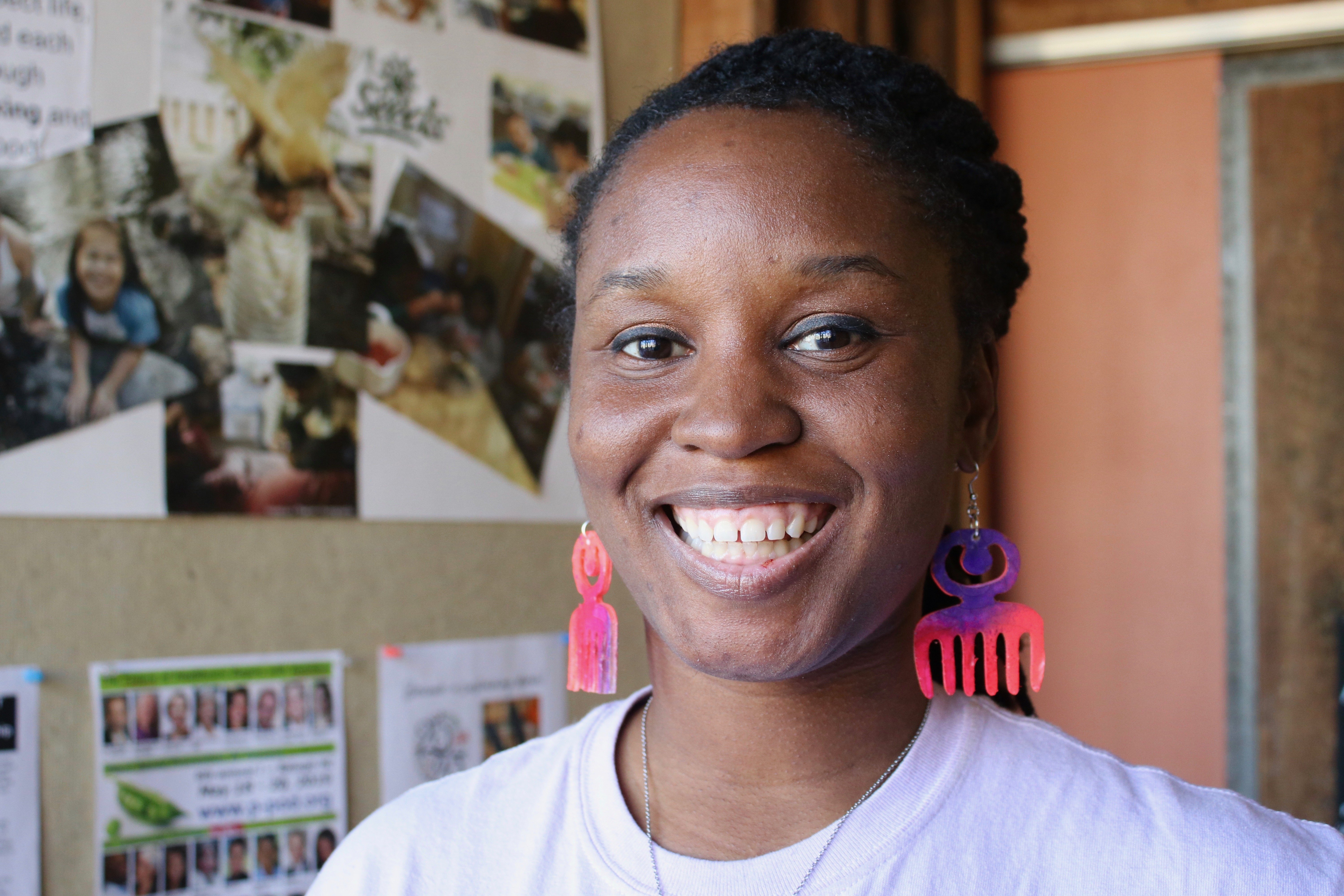
Farmer Chantel Johnson, who raises pigs and chickens at her homestead in rural N.C., poses for a portrait after a recent speaking engagement at SEEDS Garden in Durham. Johnson teaches others about sustainability and self-sufficiency to honor her brother, who died as a result of gun violence. (Staff Photo by Adrianne Cleven)
North Carolina farmer Chantel Johnson has found solace from gun violence through sustainable living. On March 24, she shared her experience at SEEDS urban garden in Durham as part of her “From Gun Violence to Homesteading” winter speaking tour.
“You don’t need a lot of land to grow,” Johnson said. “… Whether you have a windowsill or 12 acres or somewhere in between, you can grow.”
Johnson, who grew up on the east side of Chicago, lives in a “tiny house” at her Salisbury homestead. She uses solar electricity, has no refrigerator and raises chickens and pigs for meat to sell. Johnson, also a trained doula and social worker, uses her skills to serve the community around her.
Mickaela Smith is a junior Anthropology major at UNC-CH from McLeansville and one of the co-directors of Herban, a club that focuses on food sustainability. Herban hosted the speaking event at SEEDS. SEEDS, which “South Eastern Efforts Developing Sustainable Spaces,” is a Durham institution located on Gilbert St. in Northeast Central Durham.
Smith cited the growth of the food scene in Durham as well as the presence of the garden as reasons Herban decided to host the event in the city. Smith and other Herban members recently attended a retreat at Johnson’s homestead.
“We learned different skills like canning, how to use an ax, and taking care of animals, because she also had pigs and chickens,” Smith said. “We ate everything off the land…”
Johnson’s homesteading journey started in a dark place. Her younger brother died as a result of Chicago’s gun violence in August 2015. She described seeing him pass away at his hospital.
“We unplugged the machines, we all touched his heart and we felt him take his last breaths,” Johnson said. We felt his heart fade in our fingertips and he passed on…”
According to Johnson, approximately 393 million guns are currently circulating in the U.S. and “each day, 100 people in this country die from guns.”
During her talk, she also emphasized Durham’s gun violence issues. She noted that, in the first 11 days of 2019, six murders occurred in Durham. In 2018, according to Johnson’s research, there were 34 total homicides in the city.
Johnson cited barriers in the criminal justice process, a “lack of resources” for the Chicago area, issues in the school system and a lack of jobs for “playing a big role” in her brother’s death. Now she uses her platform to speak against gun violence in communities and to emphasize the healing power of nature and self-sufficiency.
“I think urban farming has a huge role in inner-cities as a way to deter young folks away from negative activity,” Johnson said. “To deter people’s suffering and mental issues, to do something more creative with it. And I think urban farming has a good place in growing food and healing minds.”
Johnson is a firm believer in simple, homegrown food produced in small batches. During her talk, she mentioned store-bought cake mixes and organic Doritos. “When you buy cheap meat or cheap food in general, you pay for it a lot of different ways.” Johnson said.
Malcolm Henry, who attended the talk and plans to begin homesteading in Chatham County soon, agrees that homesteading could bring healing from violence.
“ … Anyone who is sharpening steel and making weapons for that reason is … not building tools to build community and build peace,” Henry said.
Another attendee, Danielle Anaya, hopes to be a farmer as well. For Anaya, the most important lesson from Johnson’s talk was “not being scared of what people think… and just doing what you love and what you have the passion for.”
Johnson’s adventure has brought healing in more ways than one. While filming an episode of the Discovery Channel show “Homestead Rescue,” she shot a gun for the first time and began to see firearms as useful tools for homesteading. Though her memories from her brother’s death made for a tougher transition, Johnson now owns a firearm.
“How do you transform your pain into power through your passion?” she asked. “My passion has lead me to homesteading, so I’m talking to people about living a more self-sufficient life through my journey.”
One thought on ““From Gun Violence to Homesteading:” Johnson shares journey”
Comments are closed.